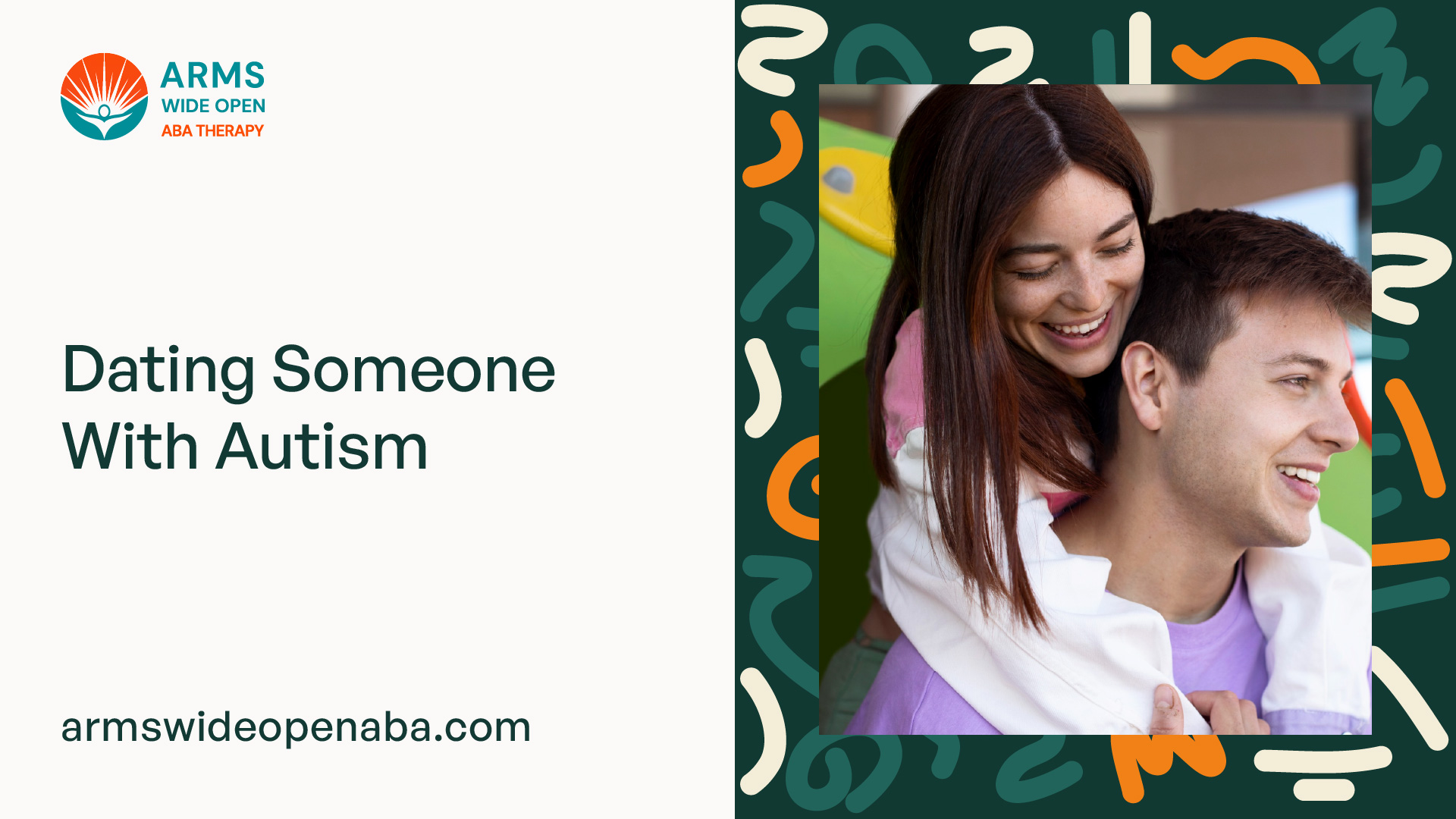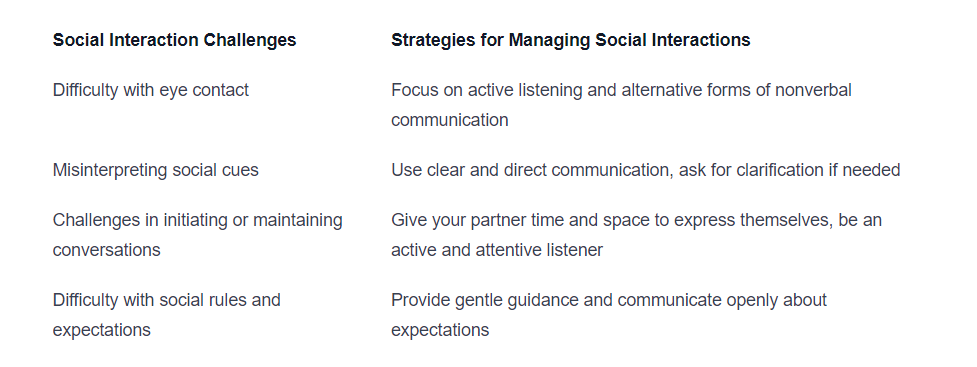Dating Someone With Autism
Navigating relationships with someone with autism? Discover the keys to emotional connections and fostering understanding. Dating someone with autism made easy!

Dating Someone with Autism: Understanding and Connection
When it comes to dating someone with autism, understanding and establishing a strong emotional connection are essential. Autism is a neurodevelopmental disorder that affects social interaction, communication, and behavior. In this section, we will explore the basics of autism and the importance of emotional connections in relationships.

Introduction to Autism and Relationships
Autism, also known as Autism Spectrum Disorder (ASD), is a complex condition that affects individuals differently. It is characterized by challenges in social interaction, communication, and repetitive behaviors. It's important to approach dating someone with autism with empathy and understanding, recognizing that their experiences and perspectives may differ from those without autism.
In a relationship with someone on the autism spectrum, it's crucial to be aware of the unique strengths and challenges they may have. By being patient, supportive, and open-minded, you can foster a deeper connection and create a safe and inclusive environment.
The Importance of Emotional Connections
Emotional connections form the foundation of any successful relationship, including those involving individuals with autism. Building a strong emotional connection involves understanding and accepting each other's emotions, needs, and boundaries. It allows for open and honest communication, mutual respect, and a sense of trust.
For someone with autism, emotional connections can play an even more significant role in their well-being. It provides a sense of security and belonging, helping them navigate the complexities of social interactions. By actively nurturing emotional connections, both partners can experience a deeper level of understanding and satisfaction in the relationship.
Establishing emotional connections requires effective communication and sensitivity to sensory considerations. It involves recognizing and accommodating the unique traits and characteristics that are often associated with autism. By incorporating strategies that promote inclusivity and understanding, you can create a nurturing environment that strengthens the emotional bond between you and your partner.
Understanding and connecting with someone with autism requires education, patience, and empathy. By embracing their unique perspective and appreciating their strengths, you can forge a meaningful and fulfilling relationship. In the following sections, we will explore strategies for effective communication, sensory considerations, and ways to address challenges that may arise in dating someone with autism.
Understanding Autism
To navigate dating someone with autism, it's important to have a solid understanding of what autism is and the common traits and characteristics associated with it. This knowledge can help foster understanding and promote a stronger connection between you and your partner.
What is Autism?
Autism, also known as Autism Spectrum Disorder (ASD), is a developmental disorder that affects how a person thinks, interacts, and perceives the world around them. It is a spectrum disorder, meaning that it varies in severity and can manifest differently in each individual.
While the exact cause of autism is still being studied, it is believed to be a combination of genetic and environmental factors. Autism is a lifelong condition, but with the right support and understanding, individuals with autism can lead fulfilling and meaningful lives.
Common Traits and Characteristics
Autism is characterized by a range of traits and characteristics that may differ from neurotypical individuals. It's important to note that not all individuals with autism will display the same traits, as the spectrum is vast. However, here are some common characteristics you may encounter when dating someone with autism:
Common Traits and Characteristics
Difficulties with social interactions and communication
Sensory sensitivities or aversions
Repetitive behaviors or restricted interests
Difficulty understanding and expressing emotions
Preference for routines and predictability
Heightened attention to detail
Strong focus on specific topics or subjects
Understanding these common traits can help you better comprehend your partner's behavior and perspective. However, it's crucial to remember that everyone with autism is unique, and their experiences may differ. Open and honest communication with your partner will play a vital role in building a strong and supportive relationship.
By familiarizing yourself with autism and the common traits associated with it, you can approach dating someone with autism with empathy and understanding. Remember to be patient, flexible, and receptive to their individual needs and preferences. Building a connection with someone on the autism spectrum requires effort from both parties, but it can lead to a rewarding and fulfilling relationship.
Building a Connection
When dating someone with autism, building a strong connection requires understanding and adapting to their unique needs. Two key aspects to focus on are communication strategies and sensory considerations.
Communication Strategies
Effective communication is essential for any relationship, and it's especially important when dating someone with autism. Here are some strategies that can help foster open and meaningful communication:
- Clear and Direct Communication: Be explicit and straightforward in your communication, avoiding vague or ambiguous language. This enables the person with autism to better understand your intentions and expectations.
- Visual Supports: Utilize visual aids such as schedules, charts, or diagrams to enhance communication and comprehension. Visual supports can provide structure and help individuals with autism process information more easily.
- Active Listening: Give the person your undivided attention when they are speaking. Maintain eye contact, use non-verbal cues (such as nodding), and provide verbal affirmations to show that you are actively engaged in the conversation.
- Patience and Time: Allow the person with autism sufficient time to process and respond to information. Avoid rushing or interrupting them, as it may cause anxiety or hinder their ability to express themselves effectively.
Sensory Considerations
Autism often involves differences in sensory processing, which can impact how individuals experience and respond to sensory stimuli. Understanding and accommodating sensory needs can greatly contribute to building a connection. Consider the following sensory considerations:
- Sensory Sensitivities: Be aware of the person's specific sensory sensitivities, such as sensitivity to noise, light, touch, or certain textures. Respect their boundaries and create an environment that minimizes sensory overload.
- Sensory-Friendly Activities: Engage in activities that are comfortable and enjoyable for both of you. This may involve choosing quiet settings, avoiding crowded places, or participating in activities that align with their sensory preferences.
- Verbal and Non-Verbal Cues: Pay attention to the person's non-verbal cues, as they may communicate their sensory needs indirectly. If they appear overwhelmed or uncomfortable, offer support and suggest adjustments to the environment if possible.
- Personal Space: Respect personal space boundaries and ask for consent before physical contact. Some individuals with autism may have heightened sensitivity to touch, so it's important to establish boundaries and be mindful of their comfort levels.
Understanding and implementing effective communication strategies, as well as considering sensory needs, can help foster a strong and meaningful connection when dating someone with autism. By creating an environment that supports their unique communication styles and sensory preferences, you can build a relationship based on understanding, respect, and mutual support.
Nurturing Emotional Connection
When dating someone with autism, nurturing and maintaining an emotional connection is crucial for building a strong and fulfilling relationship. This section explores two key aspects that contribute to fostering this connection: empathy and understanding, and establishing routines and structure.
Empathy and Understanding
Developing empathy and understanding is essential when dating someone with autism. By putting yourself in their shoes and trying to grasp their unique perspective, you can better navigate the challenges and appreciate their strengths. Here are a few strategies to help cultivate empathy and understanding:
- Active Listening: Pay close attention to what your partner is saying and demonstrate genuine interest. Show empathy by validating their experiences and emotions, even if they may differ from your own.
- Educate Yourself: Take the time to learn more about autism, its traits, and challenges. This knowledge will help you better understand your partner's behaviors and communication style, fostering a deeper connection.
- Ask Questions: Encourage open and honest communication by asking your partner about their experiences, preferences, and needs. This demonstrates your interest in understanding them better and creates a safe space for them to express themselves.
Establishing Routines and Structure
Establishing routines and structure can provide a sense of stability and predictability for individuals with autism, which can be especially beneficial in a relationship. Routines help create a sense of security and reduce anxiety. Consider the following strategies to establish routines and structure:
- Consistent Communication: Maintain clear and open communication with your partner. Discuss and establish routines together, such as regular date nights or daily check-ins, to create a shared sense of structure.
- Visual Schedules: Use visual aids, such as calendars or schedules, to outline daily activities or upcoming events. This visual representation helps your partner understand and anticipate what to expect, reducing uncertainty and anxiety.
- Flexibility and Adaptability: While routines are important, it's crucial to strike a balance between structure and flexibility. Be open to adjusting plans and accommodating changes when necessary, as unexpected circumstances may arise.
By nurturing empathy and understanding, and establishing routines and structure, you can strengthen the emotional connection with your partner who has autism. Remember that every individual with autism is unique, so it's essential to adapt these strategies to best suit your partner's specific needs and preferences. Building a strong emotional foundation will not only enhance your relationship but also create a safe and supportive space for both of you to thrive.
Addressing Challenges
Dating someone with autism may present unique challenges that require understanding and patience. Two particular areas where these challenges often arise are dealing with sensory overload and managing social interactions.
Dealing with Sensory Overload
Autistic individuals may experience sensory overload, where their senses become overwhelmed by stimuli in their environment. This can lead to feelings of distress, anxiety, or even physical discomfort. When dating someone with autism, it's important to be aware of potential triggers and take steps to minimize sensory overload.

By understanding and actively addressing sensory overload triggers, you can create a more comfortable and enjoyable dating experience for both yourself and your partner.
Managing Social Interactions
Social interactions can be challenging for individuals with autism, as they may struggle with social cues, nonverbal communication, and understanding social expectations. When dating someone with autism, it's important to be patient, supportive, and understanding in social situations.

By being understanding and accommodating in social interactions, you can help create a safe and comfortable space for your partner with autism to express themselves and engage in meaningful connections.
It's important to remember that every individual with autism is unique, and the challenges they face may vary. Open and honest communication with your partner is key to understanding their specific needs and finding strategies that work for both of you. With patience, empathy, and a willingness to learn, you can navigate these challenges and build a strong and meaningful connection with your partner with autism.
Promoting Inclusivity
When dating someone with autism, it is important to promote inclusivity and create a supportive environment that values neurodiversity. This section focuses on two key aspects of promoting inclusivity: educating yourself and others about autism and advocating for autistic individuals.
Educating Yourself and Others
Educating yourself about autism is a crucial step in fostering understanding and empathy. By acquiring knowledge about the condition, its traits, and challenges, you can develop a deeper appreciation for your partner's unique perspective. Here are some key points to consider when educating yourself:
- Familiarize yourself with the characteristics of autism: Autism is a spectrum disorder, and individuals with autism may exhibit a wide range of traits and behaviors. Understanding these traits, such as difficulties with social communication and sensory sensitivities, can help you navigate your relationship with greater empathy.
- Read books and articles on autism: There are numerous resources available that provide insights into the experiences of autistic individuals and offer practical advice for building meaningful connections. Consider exploring books, articles, and reputable websites that offer reliable information on autism and relationships.
- Engage in open and honest communication: Talk openly with your partner about their experiences and preferences. Show genuine interest in their perspective and ask questions to deepen your understanding. By fostering open communication, you can learn from each other and strengthen your connection.
In addition to educating yourself, it is important to promote awareness and understanding of autism among others. This can help create a more inclusive society and support network for both you and your partner. Here are some ways to advocate for autism awareness:
Advocating for Autistic Individuals
Advocacy plays a vital role in promoting inclusivity and creating a supportive environment for autistic individuals. By raising awareness and challenging misconceptions about autism, you can help foster acceptance and understanding. Here are some ways to advocate for autistic individuals:
- Share accurate information: Correct misconceptions and myths about autism when you encounter them. Educate others about the neurodiversity of autism and emphasize the strengths and unique perspectives of autistic individuals.
- Participate in autism awareness campaigns: Join local or online campaigns that promote autism awareness and acceptance. This can include events, fundraisers, or social media initiatives that aim to spread accurate information about autism and combat stigma.
- Support autism organizations: Contribute to organizations that focus on autism advocacy, research, and support services. These organizations play a crucial role in providing resources, promoting understanding, and improving the lives of autistic individuals and their families.
By educating yourself and advocating for autism awareness, you can contribute to a more inclusive society that values and supports individuals with autism. Remember, promoting inclusivity is an ongoing effort that requires continuous learning, empathy, and open-mindedness.
Sources
https://www.autismspeaks.org/expert-opinion/dating
https://autismparentingmagazine.com/honest-dating-autistic-people/
https://www.verywellmind.com/six-considerations-for-dating-on-the-spectrum-7570271
Similar articles
We’re here to help you

Our team is here to assist you in this process. Contact us for any assistance.
it’s easy to apply
We Accept Most Insurances
Our in-network insurance partnerships make ABA therapy more accessible to families throughout our service areas.







Our Insurance Process
We'll request your insurance details to help us verify your plan's coverage for ABA therapy. Once we've received this information, we'll walk you through your benefits, including copayments, deductibles and out-of-pocket maximums, so you know what to expect in advance.
Our team will then handle the preauthorization and all the necessary paperwork.
.svg)





















.jpeg)


































.jpeg)




.jpeg)







.jpeg)











.jpeg)
















